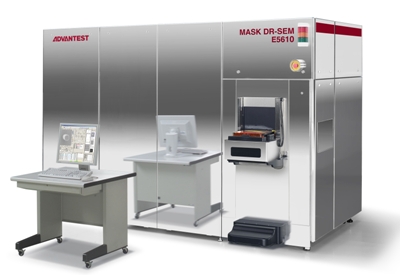Nov 16 2012
Advantest Corporation today announced that it has developed a new mask defect review tool, the Mask DR-SEM E5610, for reviewing and classifying ultra-small defects in photomask blanks.
 MASK DR-SEM E5610 (Photo: Business Wire)
MASK DR-SEM E5610 (Photo: Business Wire)
The E5610 inherits the highly stable, fully automatic image capture technology developed by Advantest for its acclaimed multi vision metrology SEM for photomasks, and features a newly developed beam tilt mechanism that enables scanning at oblique angles. With its high-accuracy, high-throughput defect review capability, the E5610 is expected to contribute to next-generation photomask product quality improvement and shorter manufacturing TAT (turn-around times).
The E5610 will be featured in Advantest’s exhibit (booth #3D-803 in Hall 3) at the SEMICON Japan trade show, December 5-7 in Makuhari Messe in the Chiba prefecture.
A Next-Generation Photomask Manufacturing Solution
Photomask manufacturing processes require 100% eradication of fatal defects, which adversely affect yield, in tandem with TAT reduction. Advantest’s new E5610 promises to be an indispensable solution for mask manufacturers, satisfying both of these requirements with fast, accurate technology that classifies defects and diagnoses appropriate repair solutions with regard to type.
Product Features
High Spatial Resolution & Oblique Scanning Capability
Advantest’s proprietary column architecture delivers spatial resolution down to 2nm, even at the low acceleration voltages appropriate for photomask screening. Moreover, the E5610 features a unique, electrically controlled tilt module that allows its beam to tilt by up to 15°, enabling users to perform 3D defect reviews.
Highly Stable, Fully Automatic Image Capture
Even when operating at high SEM magnification, the E5610 performs stable, fully automatic defect imaging at a high rate of throughput, thanks to its high-accuracy stage, charge control function, and contamination reduction technology.
Compatible With Mask Inspection Systems
The E5610 is compatible with mainstream mask inspection systems: the tool imports defect location data and automatically images the locations. It supports the industry standard KLARF (KLA Results File) format.
Elemental Composition Analysis Option
The E5610 features an optional EDS (energy dispersive X-ray spectrometry) module that performs elemental analysis—an advanced method of mapping mask blank defects.